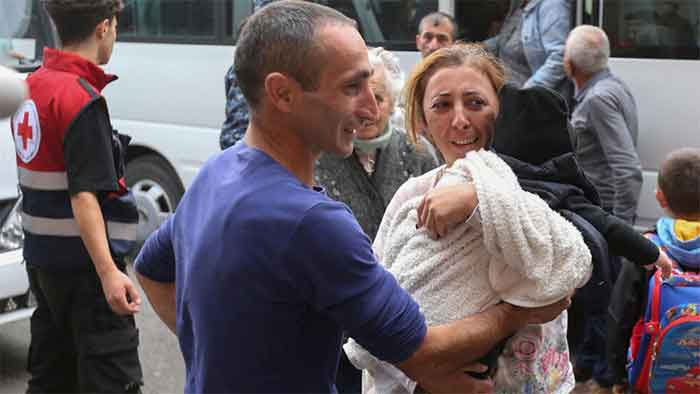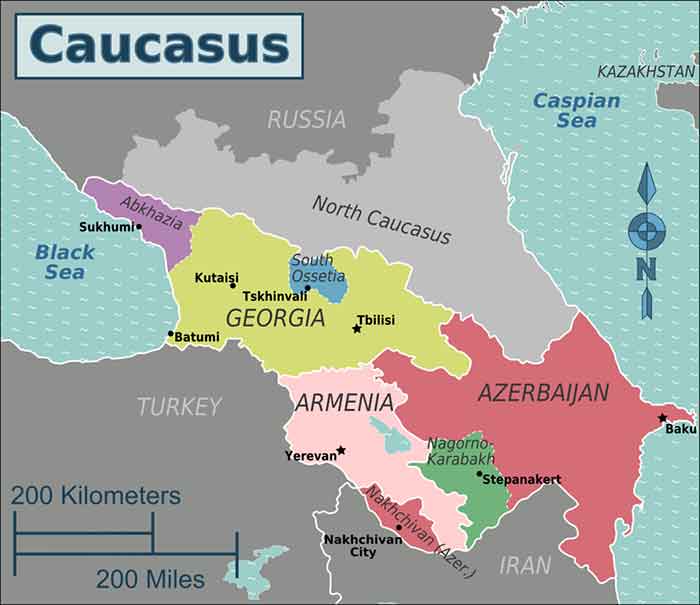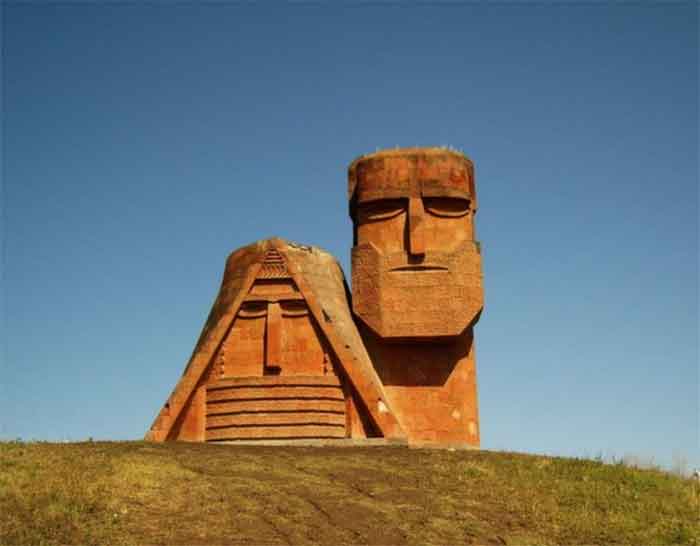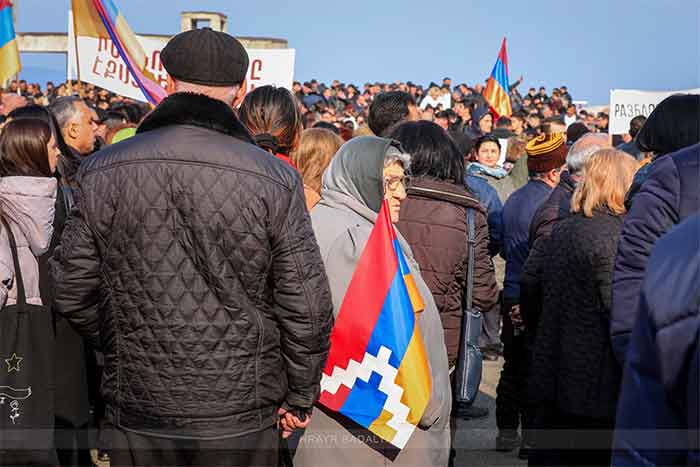
Following the one-day offensive launched by Azeri forces against Armenian forces in Nagorno-Karabakh on September 19, it was announced that the number of Armenian civilians who had fled the region had reached 89,000. Around 120,000 people were thought to be living in the region when the offensive began.
The Russian RIA Novosti news agency yesterday morning quoted Nazeli Baghdasaryan, press secretary of the Armenian Cabinet of Ministers, as saying that since September 24, “88,780 people have arrived in Armenia from Nagorno-Karabakh.”
According to the Interfax news agency, Armenian Prime Minister Nikol Pashinyan said on Thursday: “Analysis of the situation shows that in the coming days, there will be no Armenians left in Nagorno-Karabakh … This is an act of ethnic cleansing.”
The Azeri Foreign Ministry rejected the accusation, claiming the departures are a “personal and individual decision and [have] nothing to do with forced relocation.” Baku said the people of Nagorno-Karabakh would have the same rights as “citizens of Azerbaijan.”
Azerbaijan’s latest offensive, which reportedly killed a total of 400 soldiers on both sides, was a final act in a decades-long fratricidal conflict between the two former Soviet republics.
This conflict is a disastrous consequence of the Stalinist bureaucracy’s dissolution of the Soviet Union in 1991 and has re-emerged in the context of the ongoing war between two other former Soviet republics, Ukraine and Russia.
It points to the threat of the geographical expansion of NATO’s war against Russia in Ukraine, a danger that can only be stopped by the mass mobilization of the international working class in an anti-war and socialist movement.
The Armenian-backed Republic of Artsakh in Nagorno-Karabakh, declared in 1991 but not recognized by any country, announced on Thursday that it would cease to exist at the end of this year.
A decree, signed by the unrecognized republic’s president Samvel Shahramanyan, who took office in an indirect election in early September, called on the population to integrate into Azerbaijan, stating: “The population of Nagorno-Karabakh, including those outside the Republic, after the entry into force of this Decree, should familiarize themselves with the conditions of reintegration presented by the Republic of Azerbaijan in order to make an independent and individual decision on the possibility of staying (returning) in Nagorno-Karabakh.”
Azerbaijan’s latest military offensive, which resulted in the declaration of its full control over Nagorno-Karabakh, far from resolving the decades-long crisis, has only set the stage for a wider conflict in which the NATO imperialist powers and regional states will be involved.
Washington has seized on the conflict and the resulting humanitarian tragedy as an opportunity to increase its influence in the strategic South Caucasus region. The area is located south of Russia and north of Iran, as well as near international trade routes.
US Agency for International Development (USAID) chief Samantha Power, who is visiting the region, said Washington is “deeply concerned about the safety of vulnerable populations in Nagorno-Karabakh and the more than 50,000 people who have fled to Armenia.” She also said that Washington would stand in solidarity with Armenia.
“It is essential that a UN mission can access the territory within the next days,” Brussels said yesterday, while the US called to send an “international monitoring mission” to the region. The European Union has however increasingly oriented to Azeri gas because of sanctions against Russia. Baku announced yesterday that it might allow a group of experts from the United Nations to visit Nagorno-Karabakh “in the coming days.”
Although a member of the Russian-led Collective Security Treaty Organization (CSTO), Armenia has recently improved its relations with the United States under the leadership of pro-NATO President Nikol Pashinyan. Azerbaijan’s latest offensive follows a series of events that have heightened tensions between Yerevan and Moscow.
Armenia and the United States held a joint military exercise outside Yerevan from September 11 to 20. The exercise was also intended to prepare Armenian forces “for a NATO Operational Capabilities Concept (OCC) evaluation under the NATO Partnership for Peace programme later this year,” according to a US official statement.
Earlier this month, Moscow responded to Pashinyan’s remarks that military dependence on Russia was a “strategic mistake” by summoning the Armenian ambassador to the Russian Foreign Ministry.
In addition, Russia issued a note to Armenia after Pashinyan made statements in favour of the Armenian parliament’s possible ratification of the “Rome Statute.” If Yerevan ratifies it, Russian President Vladimir Putin could be arrested upon entering Armenia due to a rule of the International Criminal Court.
Azerbaijan’s latest offensive has been prepared in coordination with Turkey, as in the 2020 war. Turkish Defence Minister Yaşar Güler hosted the Azerbaijani defence minister at the end of August and the Azerbaijani chief of staff on September 11.
On the basis of the Russian-brokered 2020 ceasefire agreement, Baku and Ankara advocate the opening of a corridor (“Zangezur Corridor”) between Turkey and Azerbaijan through Armenian territory.
The agreement states: “Subject to agreement between the Parties, the construction of new transport communications to link the Nakhchivan Autonomous Republic with the western regions of Azerbaijan will be ensured.” Armenia, however, declared its opposition to any attempt to violate its sovereignty.
The corridor, which Turkish President Recep Tayyip Erdoğan has described as “strategic” is a crucial link in the Turkish ruling elite’s plans for a “Middle Corridor” from Turkey to China, in line with China’s Belt and Road Initiative.
An article by the Atlantic Council in July 2021 stated:
According to Turkish officials, as well as potentially helping to establish Turkey as one of the world’s top ten economies, the Middle Corridor initiative could also significantly reduce transit time between China and European markets. The corridor offers the possibility of a 12-day freight time frame. This compares favorably to the 20-day travel time via Russia or more than 30 days via existing maritime options.
Erdoğan told the press on Tuesday, a day after his meeting with Azeri President Ilham Aliyev in Nakhchivan that “We are doing our best to open the Zangezur corridor. There are also positive signals from Iran. If Armenia prevents the opening of the Zangezur corridor, it is possible for the corridor to pass through Iran.”
The Iranian state-owned IRNA responded: “This is the first time the Turkish president has welcomed Iran’s proposal that Azerbaijan can use Iranian territory instead of Armenian soil for its trucks to reach Nakhchivan.”
However, Tehran is not keen on a “Zangezur Corridor” through Armenia, fearing that it could alter its border with its northern neighbour and increase the influence of NATO member Turkey and Azerbaijan’s other critical ally, Israel, in the region.
Following a visit of Turkish Foreign Minister Hakan Fidan to Iran on September 3, an article published by Iran’s Mehr News Agency stated:
…Tehran is against any change in the borders of its neighbors, as well as any change in the geopolitical map of the region and creation of the corridor. The Islamic Republic of Iran believes that the creation of such a corridor will drain the geopolitical capacities of the region in favor of NATO and the Zionist regime. Because the Zangezur Corridor can provide NATO with access to the Caspian Sea.
According to the Stockholm International Peace Research Institute, Israel provided 69 percent of Azerbaijan’s major arms imports in 2016-2020. The Times of Israel reported that “Israel stepped up its weapons shipments to Azerbaijan during the 2020 Nagorno-Karabakh conflict.”
Originally published in WSWS.org














































